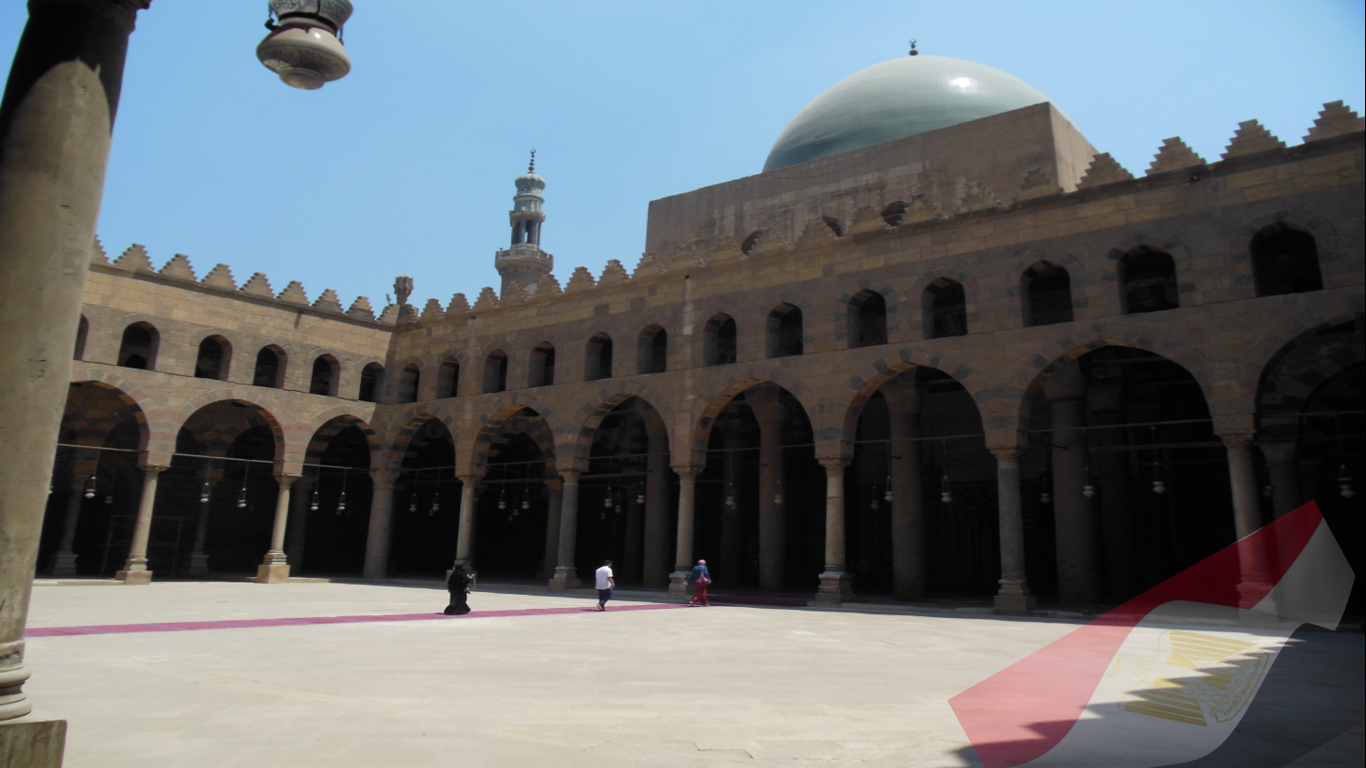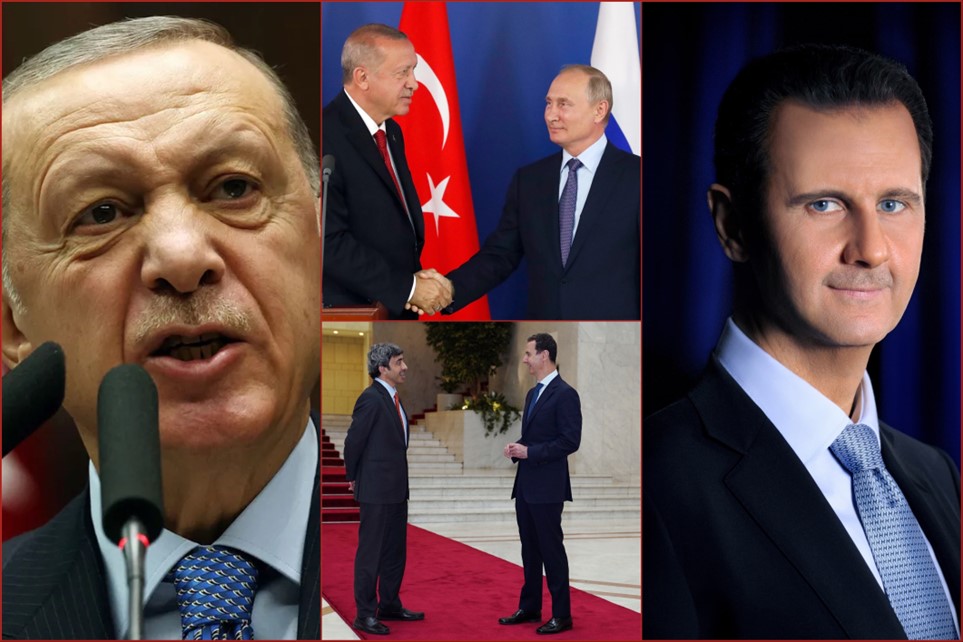On Wednesday 28 December 2022, a groundbreaking meeting took place in Moscow. The defense ministers of Syria, Türkiye, and Russia met in the Russian capital. This was the first official ministerial-level meeting between the Syrian and Turkish governments since the war against Syria broke out in 2011.
This is not the first meeting between the two sides since 2011, as politicians, army officers, intelligence directors, and allegedly even ministers have met before at various times. But these have never been completely official or were only aiming to reach a limited agreement on certain urgent matters. And they have rarely been considerably successful, or far-reaching. In other words, they never led up to an overall political engagement paving the way for a settlement, as was always desired by both sides. Even though contacts have warned up noticeably since 2018, by which time it has become obvious that the Syrian government is here to stay and cannot be unseated easily. Also, this event was still not the long-awaited bilateral meeting, which was so anticipated since then. It was obviously part of a rapprochement process pushed for by Moscow. Yet it has never really attracted the full support of Damascus, nor has it shown signs of serious Turkish concessions to get the ball rolling. So, why is it so special?
Shortly after the meeting, the Turkish side was particularly vocal to pronounce the meeting of 28 December as “groundbreaking”, stating two very important things. First that Türkiye is ready to leave Syria and hand over the territories under its current control, and second that the meeting is only a prelude to a ministerial level between Syria and Türkiye, which is to be followed by the bilateral meeting between the countries’ presidents.
Such signs and major Turkish promises have been announced before. They rarely led to serious changes on the ground. But what really shows that something is happening and the region is anxious to know about it, is a sudden visit by Emirati Foreign Minister ‘Abd Allah ibn Zāyid to Damascus on 4 January 2023.
The complexity of interests
To really see why this Turkish rapprochement project has been launched recently we have to see the realities of interests within Syria itself. Why is Ankara so dedicated? Why Russia is so keen on pushing this program, despite the obvious Syrian reluctance? Why is Syria so reluctant to take this path?
The matter is that in Northern and Eastern Syria a very complex standoff came out after the war. The immediate circle is made up of the Syrian government and its local and regional allies, Türkiye and its own, mostly extremist proxies, and the various Kurdish factions led by the American-sponsored Syrian Democratic Forces (Qasad). And behind this primary circle, there is the second, a larger one with Russia and its regional allies on the one hand, and the USA with its allies on the other.
The current reality is that while the vast majority of the country is administered by the Syrian government, there are two illegally occupied areas, and a “grey zone” surrounding them. In the North along the Turkish border and in mostly Idlib province considerable regions are occupied by the Turkish troops. Beyond their presence, there is a “buffer zone” under very real Turkish influence controlled by Turkish proxies with an always changing “border”.
At the Syrian-Iraqi-Jordanian triple border at at-Tanaf that Americans have an illegal military base, which is also surrounded by an extremist – but not Kurdish – proxies. Also, in Eastern Syria, the overwhelming majority of the Syrian gas and oil fields are under direct American occupation, along with considerable agricultural lands. From here the Americans are constantly appropriating Syrian gas, oil, and grain. Not as much for the immediate American financial benefit, but as part of the severe economic warfare waged against Syria, to suffocate its economy, and pressure its people for an uprising. The American possessions, however, do not makeup one completely occupied zone. Beyond the bases daily life is still largely administered by Damascus, but the American influence is extended by the presence of Qasad, which is expanding its control and enforcing its policies on the local population with American support. Also, regular covert operations are launched from these American possessions against the Syrian troops, to keep the situation unstable. And while the clashes between the Syrian and the Qasad troops are relatively rare, there is a constant low-level war between the Turkish proxies – and troops – and the Qasad and its affiliates.
This already complex situation is further complicated by Russian troops also present somewhat trying to manage the conflict between the Kurds and the Türkiye, but also appease Damascus and put a limit to the American maneuvers.
The main concern of Damascus is not Qasad, but to end the American presence in the East. That is crucial for security purposes, but even more economically to regain the oil and gas fields, which would have sufficient output to satisfy domestic needs and rebuild its economy. Qasad is a concern, but without the American presence, it can be dealt with. And since there is constant communication between the Qasad and the Syrian leadership, Damascus always hoped that at one point they can reach a mutually acceptable agreement. And the Qasad has also proven many times useful to keep the Turks checked. The Turkish presence is also a problem, especially the ideological indoctrination Türkiye is doing in the occupied areas, but economically less pressing than in the East. So Damascus used the two sides against each other keeping them at bay. But by now obviously without any major benefit.
Ankara also wants to end this costly engagement but is in a very delicate position not to let the areas under its control slip into the hands of Kurdish groups, which would continue their skirmishes, but within Türkiye. The best scenario would be to move 1,5-2 million Syrians into the occupied areas easing the social tension within Türkiye, hand them over to a Syrian government firmly preventing such skirmishes, and achieve some political gains. But Ankara does not only distrust Damascus in that but also its own American “allies” not to establish new positions here giving more support to the Qasad. Against which the Syrian state could do little, nor would be very interested to do so.
The Qasad has little power to take independent decisions, and thus constantly swings between Syrian, Russian, and American support. Between these so far the Americans proved to be the most generous, but at hard times they also let them down. They have become pawns in a very complex chessboard.
The Russians would be happy to see a settlement between Ankara and Damascus for a long list of reasons. Settling this matter would free up some Russian troops badly needed in Ukraine now. It could open the way for enhancing much bigger projects with Türkiye. Like setting up a gas supply center in Türkiye, from where Russian gas could return to the EU. Also, this would stabilize the grain supply route from Russia via Türkiye. There are huge economic projects between Moscow and Ankara with a volume far exceeding the importance of Syria as a whole. This largely explains why Russia never goes that far with its support for its Syrian ally to antagonize its relationship with Ankara in any way.
And as for Washington, but also a number of states in the region in conflict with either Syria or Türkiye, simply just won’t hold on to the current status as long as possible, thus pinning down the Russian, Turkish, and Syrian troops.
So, how far can a rapprochement go? Can the two states really reconcile? After the severity of the conflict between the two in the last eleven years that seems almost impossible, yet politics is a field where interest always outweighs moral, or emotional considerations. And both Ankara and Damascus are very heavily interested in moving away from their current position.
Yes, an agreement is very much possible, though the logistical implication surely will take time. Türkiye handing over areas from Idlib moving in phases to the east to the Russians, and eventually to the Syrian troops is a feasible possibility. Though probably in the East some form of joint Syrian-Russian-Turkish military presence will be pushed for, to gain guarantees against the Kurds. Syria is also in need of such reconciliation. Less for regaining these territories, as currents it lacks the sufficient means to rebuild and fully integrate them. But much more for opening the Turkish border for goods, transport, and financial engagements. Which at least on some level could break the economic blockade.
The incentives and obviously the political will is there. It is much harder to hammer out the details after such a long war, with so many factors to consider. And with no real trust in each other.
But where is Iran?
A very interesting thing to notice is how little importance Iranian diplomacy gives to this development. Eventually, it should not be a secondary matter for Tehran. The rapidly developing Russian-Iranian ties and the excellent economic cooperation between Ankara and Tehran both should indicate a serious Iranian involvement in a possible settlement. After all, Iran was there in all the Russian-led Astana meetings and was to most reliable Syrian supporter.
It should also be important for Syria to present at such meetings, or at least see its support behind it. Because Iran might have been less visible but played a crucial role in supporting the Syrian government in the war since 2011. So, where is the always-active Iranian diplomacy now? Why is it so elusive in the matter?
The main reason is that Iran is still pinned down in its internal problems and has much bigger matters to deal with in the region. Also, the growing Russian-Iranian partnership makes Tehran now cautious not to interfere in such Russian policies, which overall could benefit Iran as well.
For a long, there has been a rivalry in Syria between Iran and Russia regarding how far their respective spheres of influence can go. And while they both benefitted from the presence of the other, they had huge disagreements. Yet this all was largely ended after the war in Ukraine broke out and the Russian-Iranian ties warmed up significantly. Since then Russia has stated that its troops in Syria are fighting against terrorism and occupation together with Iran as allies.
Tough Iran could, and from Damascus’ point of view should play a major role in the current Turkish-Syrian reconciliation, Iran is simply too busy, and has a much bigger interest in Russia today.
A very telling visit
The overall political climate has noticeably become very active after the 28 December meeting in Moscow. Noticeably by the Turkish side, but unlike with previous attempts, now the Syrian government did not rush to cool down enthusiasm and reject any serious engagement before Turkish withdrawal. With its tacit approach, it gave a more “wait and see” look to the process.
That is very understandable. The Syrian government has agreed to a number of limited settlements with the Turkish side before. The most important was the ceasefire in March 2020 after the Syrian Army launched operation “Idlib Dawn 2” to retake as much as possible from Idlib Province mostly occupied by the Turkish troops and its extremist allies. According to the ceasefire, the M4 highway should have been reopened between Latakia and Aleppo and the Turkish troops should have pulled its extremist proxies back from small-scale skirmishes. This only happened for a short time, only to break down eventually, leading to the current uneasy stalemate, which by now is a serious problem for all sides. And thus Damascus gave tacit support on a very limited scale to Kurdish paramilitaries to keep the Turkish forces and their proxies busy.
Damascus has good reasons not to trust even signed agreements with the current Turkish leadership. Nor does even the Russian mediation guarantees that much. Both the March 2020 ceasefire in Idlib and Moscow’s air defense against the continued Israeli aggressions have proven overall not too dedicated. There is a growing complaint by Syrian circles that Russia could and should do much more. And though this is not the official political line, Russia has a much smaller credibility and a smaller persuasive power than what it had in 2015.
All that added to the fact that this year very important elections are coming up in Türkiye, we can assume that all that we see is motivated by the ongoing major Russian-Turkish dealings and the publicity is just part of the election campaign. Syria is assisting, noticeably for the first time since this process started, but understandably skeptical. Meaning that behind the scenes actually there is very little going on. But is that accurate?
This assumption came shortly after the visit by Emirati Foreign Minister ‘Abd Allah ibn Zāyid to Damascus on 4 January. It should be pointed out right away that even though Syria is still highly isolated in inter-Arab politics now, a high-scale delegation from the Emirates is not that overall surprising. Not that significant.
In late 2018 it was the Emirates that “broke the ice” in the Arab world – and especially in the Gulf – by reopening its embassy in Damascus and relaunching diplomatic ties with the Syrian leadership. Which was soon followed by most GCC states, by now only leaving out Qatar – the key ally of Türkiye – and Bahrain. It was also the Emirates to break the political isolation of the Syrian president in the Arab world, when in October 2021 held a long telephone conversation with the Crown Prince of Abū Zabī Muḥammad ibn Zāyid, the de facto leader of the Emirates, who has since become the President of the UAE. Then Abū Zabī promised political and economic support, and soon that was followed by another groundbreaking moment, when Foreign Minister ‘Abd Allah ibn Zāyid visited Damascus in November 2021. Political ties were rapidly warming up between the two sides, which eventually led to President Baššār al-Asad’s first visit to an Arab country since 2011, when in March 2022 he visited the Emirates.
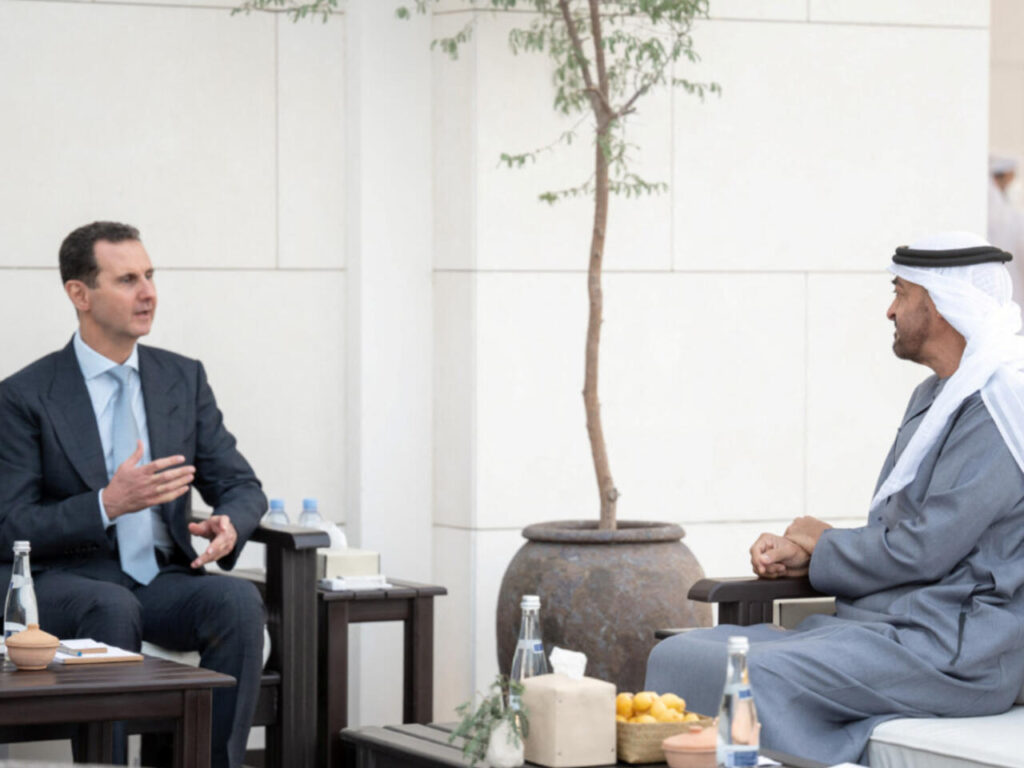
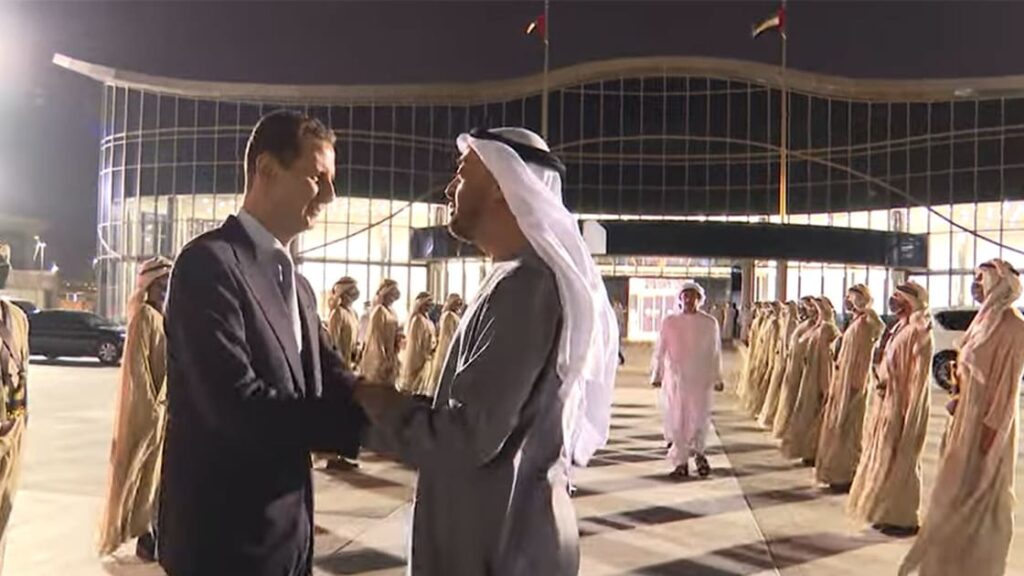
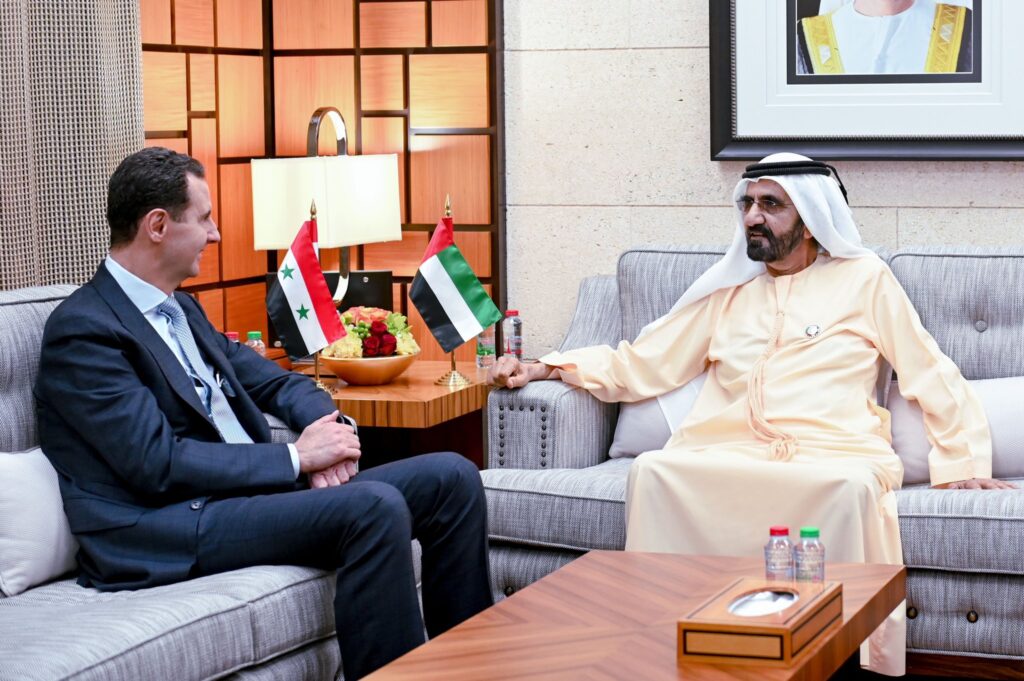
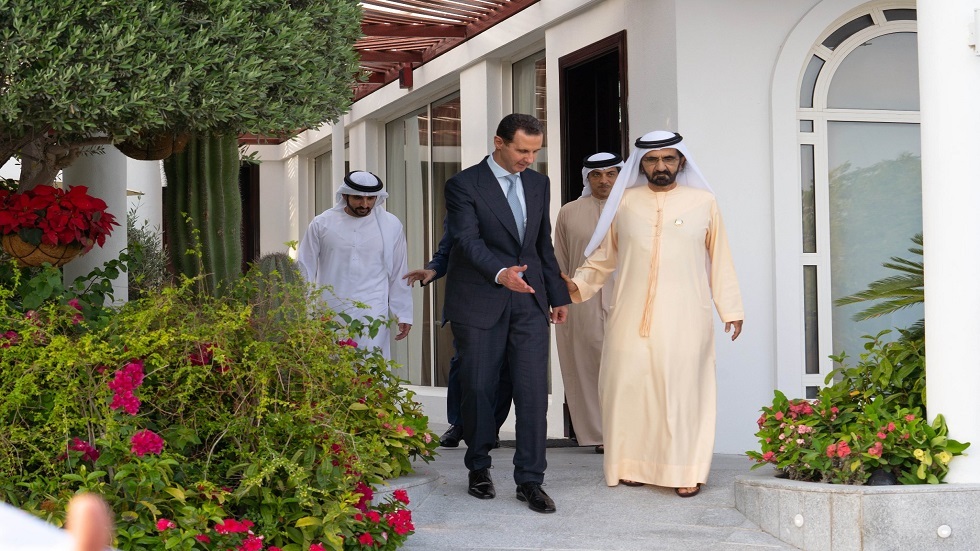
At that time it seemed that the Emirates will pave the way for ending Syria’s isolation in the Arab world and its return to the Arab League and to inter-Arab politics. A track that was much endorsed by a number of states, like Algeria, Iraq, and Lebanon. Though not many tangible results have come out of it yet, the Emirates is indeed giving some political support to Damascus and has opened its labor market for Syrians considerably somewhat helping the Syrian people.
So, though the last Emirati step was almost a year ago, it would not seem that this visit by the Emirati Foreign Minister was that surprising or even that important. Except that after this relatively short and cordial meeting not much was mentioned beyond the diplomatic formalities by either side. What was the purpose of this visit and why it was so urgent now, as it was not scheduled? There is no answer to that by the official channels.
It is particularly interesting that only a few days prior, on 2 January Tel Aviv announced that Israeli Prime Minister Netanyahu will soon visit the Emirates to enhance political ties. This is good, as the Emirates have congratulated Netanyahu for forming the new government, which is highly criticized for involving extreme political groups. Yet right before such an important engagement, the Emirati Foreign Minister paid a visit to Damascus on seemingly uneventful diplomatic courtesy. Why?
That is not a coincidence at all. Though there have been signs of Turkish attempts to engage with the Syrian government in some form and launch a rapprochement process that was so far clearly rebuffed by Damascus. Every time Turkish officials hinted at a possible meeting between Erdoğan and al-Asad, the Syrian channels rapidly rejected the idea. But not this time. Right after an official meeting between a Syrian and a Turkish minister with very little openly stated what they agreed on, and after numerous claims by Ankara that other high-level meetings are on the horizon there are questions. Is that really serious? Is that really heading to a rapprochement? How far Syria is ready to go to solve the problem with Ankara? How many concessions is Damascus ready to give?
These are all crucial questions for the whole region, and for the Emirates as well, very directly. Not that much for its concerns for Syria. In the Emirati regional political equation, Syria is important, but a very specific mindset. The UAE’s main regional rival is still Qatar, which has just managed to boost its image considerably. After the failed attempt to crush the Qatari leadership with the economic blockade between 2017 and 2021, Abū Zabī had to recalibrate its tactics. And in that keeping Turkey busy, or keeping pressure on it is critically important, as Ankara is the main regional supporter of Qatar. A grand economic and political rapprochement between Abū Zabī and Ankara has also been launched within the same policy, both offering benefits, but keeping the card for pressure as well if Türkiye would be ready to downgrade its partnership with Qatar.
That is why Syria is so important for the Emirates since as long as Turkish troops are pinned down here, there is always a way to put more pressure on Ankara, while on the other hand if the interests suit that, Abū Zabī could be a negotiator between Ankara and Damascus in some capacity. A position that gives weight to Emirati diplomacy in the region.
It is thus understandable that it was very important for Abū Zabī to find out how far negotiations with the Turkish sides are about to go. That was the real mission. This shows that something is really forming between Moscow, Damascus, and Ankara.

